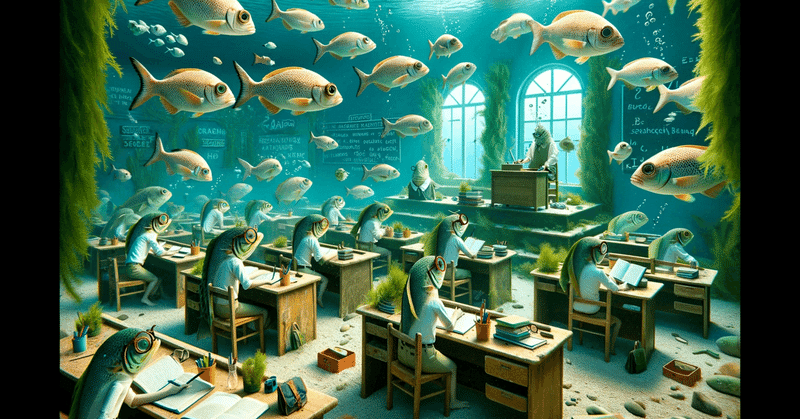
寂れた学舎で養成される、風味豊かな海の生き物 気ままなリライト127
Deserted schools, once alive with the buzz of young minds being cultivated, have transformed into nurseries for marine life, repurposing their unused properties into thriving aquaculture farms. Those schools-turned-aquafarms are serving as an ideal setting for nurturing a new generation of aquatic inhabitants, leveraging the existing infrastructure of water utilities and drainage as a springboard for onshore farming business. The silence left by the absence of children is being filled with the energetic activities of aquatic juveniles until they leave their alma mater, destined for a journey to the marketplace as highly sought-after 'graduates.'
Behind the trend of enrolling aquatic juveniles in abandoned schools-turned-aquaculture farms is a widespread recognition of onshore aquaculture as a sustainable, ethical and delicious seafood source. Away from the aquatic juveniles’ natural habitats, those farms are akin to elite institutions, offering controlled 'education' in optimal living conditions through precise management of temperature, lighting, and water quality. Adopting onshore aquaculture in repurposed settings is playing an influential role in minimizing the ecological footprint, decreasing the reliance on antibiotics, and eliminating the risk of farmed species escaping into the wild, protecting indigenous ecosystems. This approach is gaining traction among consumers who value the health benefits of seafood enriched with omega-3 fatty acids, protein, and vitamins, effectively overturning any lingering doubt about the quality of farmed fish. The esteemed reputation of those aquaculture graduates is making waves in local communities and restaurants known for their local delicacies, particularly among gourmets in search of top-tier culinary delights.
Repurposing a defunct school into an aquaculture farm has emerged as a mutually beneficial strategy for local municipalities and aquaculture businesses alike, rather than a mere compromise. In Izumo City, Shimane Prefecture, this inventive journey began when the local authorities, looking to revitalize an unused middle school standing idle since 2015, extended a cost-free offer to Showa Kaihatsu Kogyo. This local development firm, wary of the hefty expenses associated with constructing new aquaculture infrastructures, saw an opportunity. Bolstered by a partnership with JR West Innovations, a branch of JR West, this venture kicked off in January 2022 with the goal of rejuvenating the community and invigorating the local seafood industry, while fostering communal pride and purpose. By March 2023, this collaboration bore fruit with the debut shipment of threadsail filefish, raised in what was once the school's gymnasium, now transformed into an "aquatic dormitory." This novel space is equipped with two 20-ton tanks and three 3-ton tanks, nurturing several hundred charming juvenile fish, endearingly termed "The fish of your eye." Katsuyuki Doi, president of Showa Kaihatsu Kogyo and an alumnus of the repurposed school, shared his vision, “I wanted to breathe new life into my ghost alma mater by cherishing 'The fish of your eye' as the apple of my eye.”
Lifeless school premises have been finding new lease on life, paralleling a surge in the trend toward a land-based aquaculture among seafood production companies, with a significant uptick in the number of new entrants, soaring from 60 in 2015 to 124 by 2022, as reported by the Fisheries Agency. Leading this wave of repurposing school facilities are ventures like a tiger puffer fish farm in Kawachi Town, Ibaragi Prefecture, and a sockeye salmon farming operation in Kawamata Town, Fukushima Prefecture.
As a successful model for urban aquaculture on land, R Company in Nagaizumi Town, Shizuoka Prefecture has made a breakthrough with the serendipity of a disused 25m-long swimming pool at a defunct elementary school in Shizuoka. Since 2015, the pool, once bustling with the activity of young swimmers, lay dormant, its surface covered with moss, silently awaiting a new purpose. Seizing this unique opportunity, R Company ventured into the cultivation of sea grapes, an Okinawan specialty seaweed, by setting up 16 tanks within the pool for this very purpose. Those tanks are rigorously managed to replicate the marine conditions of Okinawa to perfection, fostering the sea grapes' growth in an optimal environment. By establishing the farm closer to the Tokyo metropolitan area, R Company aimed to reduce transportation costs significantly and ensure the delivery of fresher products to urban consumers.
この記事が気に入ったらサポートをしてみませんか?
